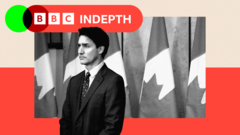Canada has faced a housing crisis, with skyrocketing rents and inadequate accommodation for many families, exacerbating feelings of uncertainty among residents. Listings in cities like Brampton reveal shockingly poor living conditions, prompting widespread online outrage. According to a recent report, about 2.4 million Canadian families are living in homes that are overcrowded, in dire need of repairs, or simply too expensive. As inflation continues to plague the economy, the topic of immigration has shifted from being a source of pride to a focal point of concern.
Public opinion is shifting rapidly. For the first time in recent memory, over half of Canadians now believe immigration levels are too high. Data from Environics shows a jump from 27% expressing this viewpoint in 2022 to 58% in 2024. The emergence of grassroots campaigns and protests against immigration in major cities indicates a significant shift in public sentiment that political leaders can no longer ignore.
Trudeau, who previously enjoyed high approval ratings, cited "internal battles" as a reason for his abrupt resignation. His government had aimed to increase immigration to bolster economic recovery following the pandemic, yet critics argue he was slow to address the public's rising frustrations over housing and living costs. Although immigration wasn't the sole cause of his downfall, it acted like a "cherry on top" of an already precarious situation, as pointed out by political analysts.
In light of the discontent, Trudeau announced a plan in October to reduce immigration targets by 20% over three years, attempting to regain public trust and give local governance time to catch up with population growth. Yet, with his resignation, mending public perception could prove challenging for his successor.
The political climate is further complicated by the recent election of Donald Trump and his strong stance on immigration. Many believe his policies may influence rising anti-immigrant sentiment in Canada. While Trump’s approach historically led to surges in asylum claims and heightened tensions at the border, Canadian authorities are now preparing for potential changes with advanced security measures.
Despite an influx of negative sentiments directed at newcomers, not everyone agrees on blaming them for the challenges facing Canadians. Some argue that the housing crisis is the result of decades-long neglect regarding affordable housing construction rather than immigration itself.
Toronto Mayor Olivia Chow, herself an immigrant, pointed out that blaming the housing situation solely on immigrants is misguided. Instead, she emphasizes addressing systemic issues rather than targeting vulnerable groups. The dichotomy of views on immigration reflects a complex landscape where personal experiences shape opinions and policy directions.
As Canada heads into critical election seasons, the demographic makeup of the country's electorate—where many are first or second-generation immigrants—will play a significant role in how the immigration debate unfolds. While certain political factions may advocate for decreased immigration, public opinion is likely to remain nuanced, with many still appreciating the contributions immigrants have made to the country.
This evolving narrative underscores the complexity of immigration in Canada, suggesting that the conversation will continue to grow in intensity as social, economic, and political factors converge.
Public opinion is shifting rapidly. For the first time in recent memory, over half of Canadians now believe immigration levels are too high. Data from Environics shows a jump from 27% expressing this viewpoint in 2022 to 58% in 2024. The emergence of grassroots campaigns and protests against immigration in major cities indicates a significant shift in public sentiment that political leaders can no longer ignore.
Trudeau, who previously enjoyed high approval ratings, cited "internal battles" as a reason for his abrupt resignation. His government had aimed to increase immigration to bolster economic recovery following the pandemic, yet critics argue he was slow to address the public's rising frustrations over housing and living costs. Although immigration wasn't the sole cause of his downfall, it acted like a "cherry on top" of an already precarious situation, as pointed out by political analysts.
In light of the discontent, Trudeau announced a plan in October to reduce immigration targets by 20% over three years, attempting to regain public trust and give local governance time to catch up with population growth. Yet, with his resignation, mending public perception could prove challenging for his successor.
The political climate is further complicated by the recent election of Donald Trump and his strong stance on immigration. Many believe his policies may influence rising anti-immigrant sentiment in Canada. While Trump’s approach historically led to surges in asylum claims and heightened tensions at the border, Canadian authorities are now preparing for potential changes with advanced security measures.
Despite an influx of negative sentiments directed at newcomers, not everyone agrees on blaming them for the challenges facing Canadians. Some argue that the housing crisis is the result of decades-long neglect regarding affordable housing construction rather than immigration itself.
Toronto Mayor Olivia Chow, herself an immigrant, pointed out that blaming the housing situation solely on immigrants is misguided. Instead, she emphasizes addressing systemic issues rather than targeting vulnerable groups. The dichotomy of views on immigration reflects a complex landscape where personal experiences shape opinions and policy directions.
As Canada heads into critical election seasons, the demographic makeup of the country's electorate—where many are first or second-generation immigrants—will play a significant role in how the immigration debate unfolds. While certain political factions may advocate for decreased immigration, public opinion is likely to remain nuanced, with many still appreciating the contributions immigrants have made to the country.
This evolving narrative underscores the complexity of immigration in Canada, suggesting that the conversation will continue to grow in intensity as social, economic, and political factors converge.





















